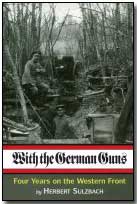Prose & Poetry - Herbert Sulzbach
 Herbert Sulzbach (1894-1985), who wrote
a classic account of his World War One service with the German army, also
unusually served during World War Two - this time however with the British
army, before returning to Germany after the war to serve the post-Nazi
government in a cultural capacity.
Herbert Sulzbach (1894-1985), who wrote
a classic account of his World War One service with the German army, also
unusually served during World War Two - this time however with the British
army, before returning to Germany after the war to serve the post-Nazi
government in a cultural capacity.
Sulzbach was born in February 1894 to a prosperous Jewish family based in Frankfurt-am-Main. His grandfather, Rudolf, founded a private bank in 1855 that was the forerunner of the present day Deutsche Bank.
With the outbreak of war in August 1914 Sulzbach determined to sign up as quickly as possibly for Kaiser and country. He was accepted on 8 August into the 63rd Field Artillery Regiment (Frankfurt) and was rapidly despatched to the Western Front for active service within a month.
Sulzbach served almost the entire duration of the war on the Western Front except for a brief period spent on the Eastern Front. During the 1916 Somme Offensive he was the recipient of the Iron Cross (Second Class) and at Villers-Cotterets in 1918 he again received the Iron Cross (First Class), and also the Frontline Cross of Merit from the leader of the Third Supreme Command, Paul von Hindenburg.
Despite ultimate German defeat in November 1918 Sulzbach retained his faith in the Kaiser, believing him to have been made the scapegoat by politicians and military figures alike.
He published his diary of the war, Zwei lebende Mauern, in 1935. Its self-evident patriotism earned him initial popular renown and popularity before he was forced to flee his homeland in exile in 1937 in fear of the Nazis.
Migrating to England Sulzbach was commissioned into the British army with the onset of the Second World War and given responsibility for the de-Nazification of German prisoners.
Following the Second World War he returned to Germany and took up employment as a cultural officer for the German government at their London embassy, in the course of which he was awarded the Paix de l'Europe medal for fostering cross-cultural understanding.
An English-language translation of his 1935 memoir was belatedly published in 1973 as With the German Guns: Four Years on the Western Front, earning him renewed popular acclaim.
He died in 1985.
The Russian war ace Alexander Kozakov claimed 20 victories during the war; his nearest compatriot, Vasili Yanchenko, claimed 16.
- Did you know?
